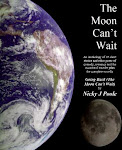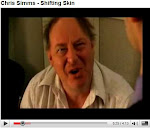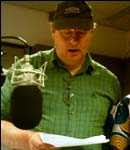(Short story with a new twist on an infamous old problem)
Fluorescent jackets, two, bright yellow, Day-Glo strips, belts heavy with equipment – night-stick, radio, spray, cuffs – below stab-vests. Fluorescent strip lights, dirty grey, flooded the shadow-less pallor of late-night casualty. The police officers approached the reception desk. The triage nurse nodded in dull acquiescence towards the far corridor, opposite the entrance, leading out of the waiting area to the treatment section. The officers walked through.
#
"Mrs Beryl Rimmer?" said the first officer. The second stood holding back the plastic curtain of the assessment cubicle. The nurse, a plump-ish woman in her forties, finished attending to a dressing on Mrs Rimmer’s face. She’d seen this all before. She stepped round the trolley and squeezed past the second officer, out into the corridor.
"How did it happen?" said the officer.
"How did it happen?" said the officer.
#
Bob was late. Beryl hated it when he didn’t come home in time for tea. She was always fearful there would be a scene. She would try to avoid it, try not to say anything that might upset him, provoke him into one of his moods. But it wasn’t fair. He would be out enjoying himself, spending their money, having too much to drink. He always seemed to drink too much these days. How was she supposed to get on with her life, let alone enjoy herself, when she didn’t know what time he’d be back? Or in what state?
It hadn’t always been like this. There were the good times. The old times. Back when they were first courting. They couldn’t get enough of each other then. There was no where else either of them wanted to be. Now, it was difficult to be in the same room together, without there being an atmosphere. A tension.
She flipped the shirt over on the ironing-board. She’d done the sleeves, now the shoulders, about to do the back. Her mother had always said, "Be a good housewife, and your man won’t wander." That, and "A happy marriage is one where both of you know your place." All sounded a bit old-fashioned now. The iron was too hot, but she didn’t think to turn it down. As long as she didn’t linger, it would be alright. Get the creases out faster.
She thought she heard his key in the lock.
#
"Had your husband been drinking, Mrs Rimmer?" said the officer. The other took notes.
"Why do you ask that?"
"You said he was late home. Why was that?"
"He can come and go as he pleases. I don’t mind him spending a bit of time with his friends. There’s nothing wrong with our marriage."
"Of course not," said the officer. "Was he drinking with his friends?"
"He might have been."
"Is that why he stayed out?"
"He doesn’t stay out," she said, defensively. "He’s always back at a proper time."
#
Bob let himself in. Beryl was ironing. That was good. He was pleased to see her doing some housework. Perhaps she had learnt her lesson. It wasn’t just for him. There were the children to think of. They needed a good family environment to grow up in. Perhaps she had sent them off to bed early. He didn’t like them to see when he and Beryl had words. "Any tea?"
"Don’t you go expecting to be fed at this time of night," she said. He thought he saw her bite her lip. "I threw your dinner in the bin."
He was angry and disappointed. "I told you I was going to be a little late." He was hungry, and he had told her he wasn’t sure when he’d be home. He had had nothing to eat and here she was, being difficult. Why for once couldn’t she just do the right thing – get him a meal that would keep till he got back. "It was a leaving do. I couldn’t come home any earlier."
"Oh no, of course you couldn’t. Always putting someone else before me."
"How dare you say that," he retorted. "I’ve always put you first."
She seemed unable to contain herself. "You go out, spending our money on yourself and your mates. What about me?"
Bob was surprised. It wasn’t like her to refer to his friends like this. She usually didn’t even mention them, as if she preferred to pretend they didn’t exist. Why couldn’t she be more reasonable? Why couldn’t she be friends with them too? He felt his anger rising. "They could be your friends too if you’d make an effort. "And as for ‘our money’? This is my money. I earned it. And I haven’t spent all of it. Trouble is, my sweet angel, if I bring it home you go through my pockets and steal it and spend it on clothes that make you look like a tart. Most men would give you a clip round the ear for carrying on the way you do!"
#
The police officers pushed into Bob’s cubicle.
"You Bernard Rimmer?" said the first officer.
"Bob," said Bernard. "My friends call me Bob."
"Well, Bernard," said the second officer, "would you mind telling us how you come to be here?"
"It all started when I was a little late getting home from work," he said. "It was somebody’s leaving do. A colleague who’d been with the company for ages. We were giving him a good send-off. Drinks, food, everything. Or, rather, everyone else was. I could only stop for a couple of drinks. My wife, Beryl, doesn’t like me staying late after work. No matter what the reason. Then my colleague – the one who was leaving – bought everybody a round of double brandies. That was very nice of him, that. I bought him one back, knocked one back myself. Then I had to dash off. I had to catch a bus – I couldn’t drive after all that alcohol. That made me even later."
"What happened when you got home?"
"Well, I’d all this to drink on an empty stomach. I’d not had any time for anything to eat. So when I got home I was starving. Beryl – that’s my wife – said she had cooked me some dinner but thrown it away. I’d told her I was going to be late home. There was no need to do that. It’s not right."
"So you hit her," said the first officer.
"It wasn’t like that," Bob protested.
"Let me just go and check with the doctor," said the second officer. "I think he’ll confirm somebody hit her."
"Yes – no," Bob struggled for words. "I did hit her. But it wasn’t like that!"
"You Bernard Rimmer?" said the first officer.
"Bob," said Bernard. "My friends call me Bob."
"Well, Bernard," said the second officer, "would you mind telling us how you come to be here?"
"It all started when I was a little late getting home from work," he said. "It was somebody’s leaving do. A colleague who’d been with the company for ages. We were giving him a good send-off. Drinks, food, everything. Or, rather, everyone else was. I could only stop for a couple of drinks. My wife, Beryl, doesn’t like me staying late after work. No matter what the reason. Then my colleague – the one who was leaving – bought everybody a round of double brandies. That was very nice of him, that. I bought him one back, knocked one back myself. Then I had to dash off. I had to catch a bus – I couldn’t drive after all that alcohol. That made me even later."
"What happened when you got home?"
"Well, I’d all this to drink on an empty stomach. I’d not had any time for anything to eat. So when I got home I was starving. Beryl – that’s my wife – said she had cooked me some dinner but thrown it away. I’d told her I was going to be late home. There was no need to do that. It’s not right."
"So you hit her," said the first officer.
"It wasn’t like that," Bob protested.
"Let me just go and check with the doctor," said the second officer. "I think he’ll confirm somebody hit her."
"Yes – no," Bob struggled for words. "I did hit her. But it wasn’t like that!"
#
The two officers stood, heads together, in the corridor as the doctor approached them. One turned to the other and said, "I hate domestics."
"Waste of time, if you ask me," said the other. "She should just walk out and leave him and take the kids with her. Divorce him, have the house, all of his money, and be done with it. Get rid of the bullying little creep for ever."
"Just got the results of the x-ray," said the doctor. "Mrs Rimmer has a broken cheek-bone. She’s been struck a very heavy blow, possibly with a blunt object."
"Good enough for me," said the first officer, "let’s go and arrest the sod."
The two officers pushed their way into Bob’s cubicle once more. "Bernard Rimmer, you are under arrest for assault occasioning actual bodily harm. Anything you say will be used as an excuse to beat the crap out of you."
The police officer hadn’t realised the doctor had followed him in to the cubicle and was standing right behind him. "I think there is something you should see first," said the doctor.
"I was trying to tell you before," Bob protested. "When I got home, my wife was ironing. I offered to give her the money I still had from the leaving do when I came in. As I put it down on the ironing board, she trapped my hand with the iron. She burned me! The only way I could get free was to pull the iron off. It broke free and hit her in the face. I was only trying to protect myself."
The doctor pushed between the two police officers and showed them both Bob’s hand.
There, right across the palm from fingertips to wrist, was a livid purple burn, triangular, curved edges, in the shape of an iron.
"His hand must have been in contact with something very hot for quite some time to inflict such a severe wound," said the doctor. "If it had been me, I don’t think I could have stuck it for so long."
The end
Epilogue – Ignorance Isn’t Bliss
"In January 1999 the UK Government’s Home Office published the results of a survey into domestic violence. It was the biggest ever carried out anywhere in the world and involved more than 10,000 men and women.
"It was called Study 191 and it stated, quite categorically, that 4.2% of men and 4.2% of women perpetrate the crime of domestic violence. In other words they had discovered that men and women are equally violent."
For any who wants information about men being victims of domestic abuse, contact www.mensaid.com, help@mensaid.com or call 087 1223 9986.
.jpg)






